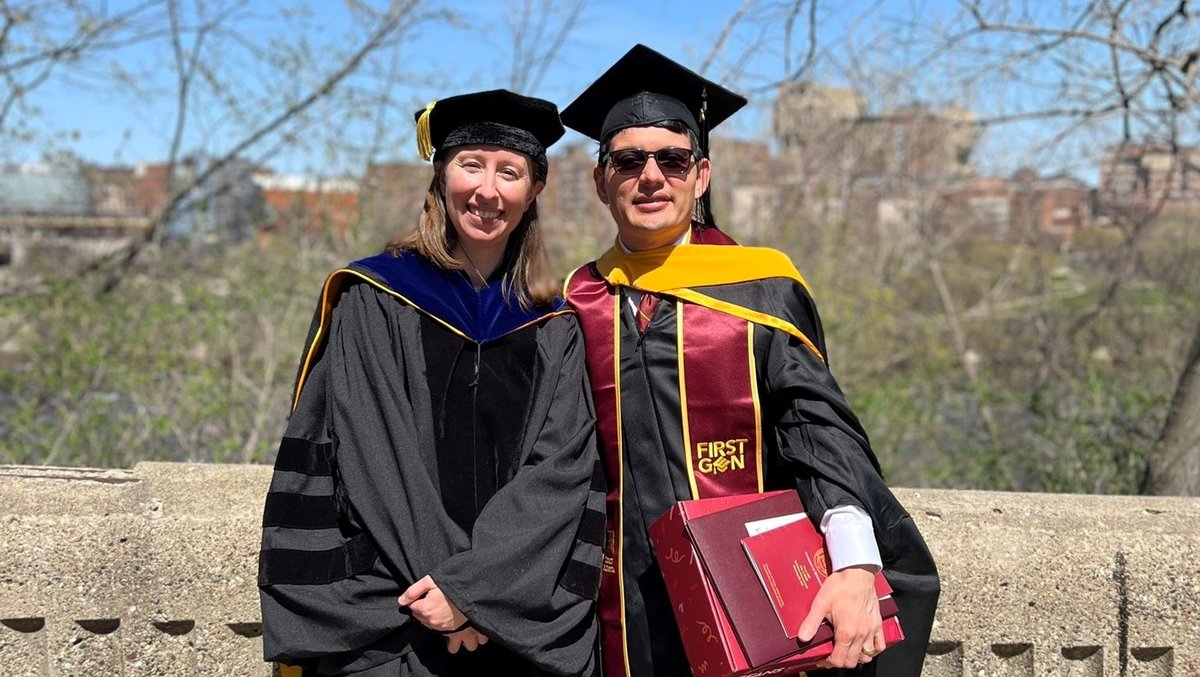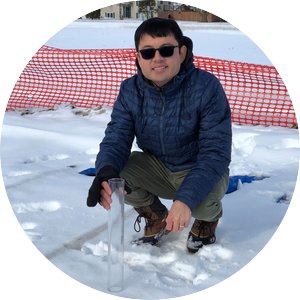It wasn’t until he left a corporate career that Luis Allen was able to pursue his passion for science and the environment.

“I’ve had a very non-linear path coming here. I’m a first generation immigrant. I have a previous career in the business world. It’s been… quite a path,” said Luis Allen, at the end of his master’s thesis defense seminar.
Allen finished the master’s program in land and atmospheric science (and minor in water resource sciences) in March, and participated in commencement in May. Advised by Dr. Melissa Wilson, he studied the implications of applying manure as fertilizer in the winter, especially since Minnesota winters are warming due to climate change. (His findings? Nutrients can wash away with melting snow and pollute the water, so apply manure early if you must.)
As he concluded his presentation, Allen thanked his advisors, friends, husband and family, and he hinted at his journey as a non-traditional student that led him to study manure and work to protect the environment.
A memory of manure
Allen grew up in the large city of Tijuana, Mexico with his parents and three siblings. The family spent the summers in a rural area of Nayarit working on a cooperative farm. Allen recalled the physical sensations of those summers on the farm: “I would go and help my family with our cattle. We didn't have boots, we would just be barefoot, walking in the manure. In the morning we had to milk the cows, and then release them into the fields for them to pasture. At night, we would gather all the cattle and put them back in the corral.”
“It’s interesting how that was my beginning with manure, I got to just walk in it,” said Allen.
He didn’t consciously realize it, but Allen was already making observations about the environment and water quality of local streams during those summers. “Every year I would see the water change from very clear to brown and green,” as the season progressed, and manure moved from the fields to the waterways. Allen’s father hunted and fished to provide food for the family, so their lives were directly impacted by environmental changes. “I became very interested in water quality, seeing those changes for the worse,” said Allen.
Making a home in Minnesota
Allen’s family immigrated to the United States when he was 16 years old. The family moved to Minnesota on the advice of a family friend. Allen’s father passed away just a year after moving to Minnesota, and Allen had to work to help support his mother and siblings.
Allen was able to begin college at the age of 26 by attending night classes at Metropolitan State University. He knew that he wanted to pursue science, but he needed a more flexible program. He got a degree in human resources instead. “The University of Minnesota is just not accessible—at all—to students who have to work.” Not only did Allen experience this first hand, he later saw working students struggling when he was a teaching assistant.
He thought human resources might be a good fit because of his passion for people: “I love helping people; that's my driver.” He worked at a large bank headquartered in Minneapolis, and while he loved supporting his fellow employees, the business culture was not a good fit. “It was not in my values, and I was miserable,” said Allen.
His husband David could tell that he was unhappy. “I would come home every day with this sad face, and my husband was seeing that,” said Allen. “He asked me, if you could do anything, what would you do?” Allen said he hadn’t thought to ask himself that question for a long time, but when he allowed himself to consider it, he answered, “I would be a scientist.”
Stepping into science
With his family on a solid financial footing, Allen made the decision to quit his corporate job and go back to college, this time at the University of Minnesota. He applied for admissions to CFANS, and majored in Environmental Sciences, Policy, and Management. He was interested in the broad science background the program emphasized.
“It was tough in the beginning because I was so much older than the other students,” said Allen; he was 33 when he started his second undergraduate degree. Still in the habit of dressing professionally, Allen recalled walking into the large lecture half of the introductory soil science class on the first day. The room fell silent; his fellow students thought he was the professor. Embarrassed, he sat in the corner and tried not to draw attention to himself.
But with age and experience came a determination he didn’t have when he was younger. “My focus was very clear,” explained Allen. “Plus I took really good notes.”
“I ended up taking more soil science classes,” said Allen. Soil science faculty members Dr. Jay Bell and Dr. Nic Jelinski encouraged Allen to pursue graduate school as a next step. “I wanted to work on a project related to water quality,” said Allen, and he connected with Dr. Melissa Wilson, who would become his master’s thesis advisor.
Getting his feet wet

According to Allen, he and Wilson had a great advising relationship. “Working with Dr. Wilson was really easy. She expected me to do all the work myself… but she ensured that I had the support and resources that I needed.” He also notes that perhaps the two got along so easily because they are close in age. “We’re from the same generation,” Allen said with a laugh, but noted that she can work with anyone. “She has a diverse staff,” he said.
Allen’s project included laboratory experiments and field studies, attempting to determine the optimal timing of manure application to get the most benefit to the soil, and minimizing nutrient runoff, which pollutes the water. More than a quarter of Minnesota farmers apply manure in the winter, yet little is known about the effects on water quality. The big question was should manure be applied before snowfall, or afterward?
He added Dr. Diana Karwan to his thesis committee, a hydrologist with expertise in snow hydrology, to understand the dynamics at play during the winter. He also added Dr. Lindsay Pease, an expert in nutrient and water management in row crop systems. A committee of all women scientists is remarkable in the LAAS graduate program, which has twice as many male faculty as female. For Allen, this was an intentional choice: “For me it is incredibly important that women scientists are acknowledged,” he said.
A steward of the environment
Since completing his master’s degree, Allen has begun a new career as an environmental specialist and project manager with the Minnesota Pollution Control Agency (MPCA). It’s only been a few months, but he is excited for the new opportunity. “I'm a public servant and I just love doing that,” said Allen. “The people that I work with at the MPCA are selfless; they care about the common good.”
In this new role, Allen can continue to learn and specialize in an environmental niche that suits him. “I want to specialize in soil microbiology because that's what I'm passionate about,” said Allen. He has begun curating a newsletter of professional development opportunities that he shares with his colleagues. He plans to use his expertise in soil microbiology to come up with solutions to petroleum leaks that occur near gas stations, a common environmental problem around the state. These leaks pollute the soil and can contaminate groundwater.
Allen also plans to develop his community of people of color who are similarly passionate about the outdoors and the environment. He hopes to find people with a common interest in camping and backpacking. “In the 21 years I've been here in Minnesota, I haven't had that experience with people of color,” said Allen.
